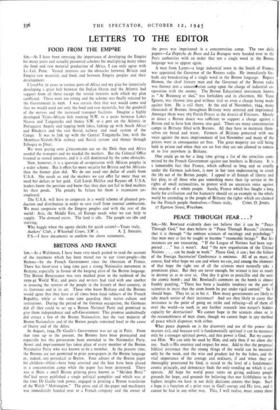BRETONS AND FRANCE Strt,—As a Welshman, I have been very
much pained to read the account of the treatment which has been meted out to our sister-people—the Bretons—by the French Government since the liberation of France. There has been, over a long time past a strong Nationalist movement in Brittany, especially in favour of the keeping alive of the Breton language. The Breton Renaissance was very marked prior to the outbreak of the 1939-45 World War, and poets and writers had vied with one another in arousing the interest of the people in the history of their country, in its literature and in its art. Those who know Brittany and the Bretons would agree that they have at all times been loyal subjects of the French Republic, while at the same time guarding their native culture and institutions. During the period of the German occupation, the Germans did all they could to set up a Breton National Party and promised to give them independence and self-Government. This promise undoubtedly did attract a few of the Breton Nationalists, but the vast majority of Breton Nationalists and of the Breton people remained loyal to the cause of liberty and of the Allies.
In August, 1944, De Gaulle's Government was set up in Paris. From that time up to the present, the Bretons have been persecuted and especially has this persecution been extended to the Nationalist Party. Arrest and imprisonment has taken place of every member of the Breton Nationalist Party who was known to be a member. At the present time, the Bretons are not permitted to print newspapers in the Breton language or, indeed, any periodical in Breton. Four editors of the Breton paper for children—Oloie—have been arrested and the four have been placed in a concentration camp while the paper has been destroyed. There was at Brest a small Breton printing press known as " Skridon Breiz " that had never published a single political pamphlet and which was .at the time De Gaulle took power, engaged in printing a Breton translation of the Welsh " Mabinogion." The press and all the paper and machinery was immediately handed over to a French company and the owner of
the press was imprisoned in a concentration camp. The two daily papers—La Depeche de Brest and La Bretagne were handed over to the Paris authorities with an order that not a single word in the Breton language was to appear again.
A man from Lyons—a large industrial town in the South of France, was appointed the Governor of the Rennes radio. He immediately for- bade any broadcasting of a single word in the Breton language. Roparz Hemon, the chief literary man and the Governor of the Breton radio was thrown into a concenteation camp upon the charge of industrial co- operation with the enemy. The Breton Educational movement known as " Ar Brezoneg er skol," was forbidden and its chairnian, Mr. Yann F,puere, was thrown into goal without trial or even a charge being made against him. He is still there. At the end of November, 1944, many thousands of Bretons throughout Brittany were arrested and imprisoned. Amongst them were 163 Parish Priests in the district of Finistere. Merely to dance a Breton dance was sufficient to support a charge against a Breton and to have him thrown into goal. There are many concentration camps in Brittany filled with Bretons. All they have to maintain them- selves are bread and water. Farmers of Brittany protested with one voice against the mass imprisonment of last November and many of the priests were in consequence set free. The great majority are still being held in prison and when they are set free they are not allowed to remain or to live anywhere in Brittany.
One could go on for a long time giving a list of the atrocities com- mitted by the French Government against our brothers in Brittany. It is a lamentable fact that France, which suffered so long and so cruelly under the German jack-boot, is now in her turn endeavouring to crush the life out of the Breton people. I appeal to all friends of liberty and fair play, to all those who pay something more than lip service to the rights of small nationalities, to protest with no uncertain voice against this murder of a whole people. Surely, France which has fought a long battle for civilisation and for humanity should set an example to the whole world by extending to the people of Brittany the rights which are claimed
for the French people themselves.—Yours truly, CYRIL 0. JONES. 17 Egerton Street, Wrexham.


























 Previous page
Previous page